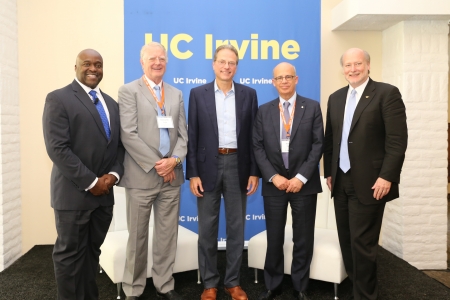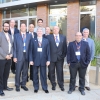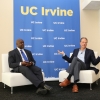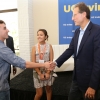Conference with Tel Aviv University Addresses Functional and Nanomaterials
 Oct. 17, 2016 - For the fifth year in a row, faculty members from the Samueli School of Engineering and the Iby and Aladar Fleishman Faculty of Engineering at Tel Aviv University (TAU) came together last month for a joint workshop to address an engineering challenge of the future.
Oct. 17, 2016 - For the fifth year in a row, faculty members from the Samueli School of Engineering and the Iby and Aladar Fleishman Faculty of Engineering at Tel Aviv University (TAU) came together last month for a joint workshop to address an engineering challenge of the future.
At the Functional and Nanomaterials 2025 (FUN) conference, Sept. 15-16, 2016, faculty, students and administrators from the two engineering schools discussed issues involving the higher education of engineers and scientists and how materials technologies will transform innovation in the coming decades.
The two-day conference included presentations on energy and sustainability, advanced materials and characterization, and electronic materials and 3-D printing, as well as an industry leadership panel discussing nanoscience from research to industry. About 100 people attended each day,
UCI Chancellor Howard Gillman, who attended the luncheon on the second day, said the conference series has led to a deepening of conversations between the two institutions and to exciting opportunities to do research together. “We recognize the strategic partnership that has developed and are looking forward to continuing it.”
TAU’s engineering dean, Yossi Rosenwaks, agreed: “I hope we have a productive and enjoyable conference leading to many important collaborations in the future.”
In addition to Rosenwaks, the Israeli delegation included the university’s president (Joseph Klafter), vice president (Raanan Rein), dean of life sciences (Daniel Chamovitz) and all seven faculty members of its Materials Science Engineering Department. UCI’s schools of engineering and physical sciences both sponsored the conference this year, and Physical Sciences Dean Ken Janda joined Engineering Dean Gregory Washington to welcome the crowd and introduce the topic. “Material sciences really is a convergence science involving biological sciences, physical sciences and engineering,” explained Janda.
A highlight of the two-day gathering was a fireside chat between the Samueli School’s Washington and its namesake, Broadcom Corp. Co-founder Henry Samueli. They discussed Moore’s Law and how it relates to the consolidation of the semiconductor industry, as well as where materials can play a significant role in new technology.
“Industry growth in the semiconductor industry is slowing,” said Samueli. “There are many opportunities in adjacent fields; we’ll be looking at applications, big data and sensors that will drive the technology world for the next few years.”
Samueli believes the function of new materials will play a huge role in developing sensors. “Imagine trying to sense the environment or the human body, ideally non-invasively; if you could do a blood chemistry analysis without opening a needle and drawing blood? That’s an unbelievable opportunity.”
Washington asked Samueli if he had any parting words of wisdom to share with students in the audience. “The opportunities are endless; problems keep presenting themselves. If trained at a leading institution and with an advanced degree, you can hardly go wrong. You are very fortunate to be in school at this time. Pursue your passion, take advantage of opportunities and don’t worry too much.”
Samueli also expressed support of the hands-on learning approach, encouraging students to pursue internships and research. “Practical training is very beneficial,” he said.
Mechanical engineering postdoctoral scholars Babak Haghpanah and Ladan Salari Sharif both attended the conference and found the talks “interesting and motivational.”
“Henry Samueli is definitely a role model for us,” said Haghpanah.
“Giving us his view of what to do now is very helpful,” added Sharif.
-Lori Brandt



